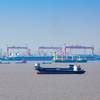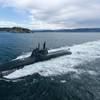The Federal Maritime Commission, or FMC, is currently making a formal investigation into exclusive tug franchise arrangements in ports in Florida and the lower Mississippi River area. The issue is whether these licenses, with which marine terminal operators grant exclusive towing licenses to certain tug companies, are unreasonably anticompetitive and violate the Shipping Act of 1984.
The FMC initially began an inquiry into supposed exclusive franchise agreements involving some tug operators and dry bulk terminals on the lower Mississippi River, but this investigation soon lead to inquiries into the practices of two Florida Ports, Port Canaveral and Port Everglades. Whether a direct result of the FMC's actions or not, Port Everglades recently ended its 43-year-long practice of using just one tug company, and allowed another tug company to begin providing services. The FMC's investigation into this practice continues.
The Shipping Act of 1984 regulates water transportation in U.S. foreign trade. In both investigations, the Florida ports and the lower Mississippi dry bulk terminals were found to be marine terminal operators ("MTOs") subject to the Act, and therefore within the FMC's jurisdiction. The two provisions of the Act at issue are Sections 10(d)(1) and 10(d)(2) provide. The former provides that no marine terminal operator "may fail to establish, observe, and enforce just and reasonable regulations and practices relating to or connected with receiving, handling, storing, or delivering property." The latter says, "No marine terminal operator may give any undue or unreasonable preference or advantage or impose any undue or unreasonable prejudice or disadvantage with respect to any person." See 46 U.S.C. §1709(d)(1) and (d)(4). The question, then, is whether or not the arrangements themselves are unreasonable under the Act.
The issue in these investigations is whether the exclusive tug agreements deprive vessel operators of the opportunity to select from a number of competing tug operators, rather than from one or merely a few who enjoy a virtual monopoly on those services. The FMC, in a June 11, 2001 order initiating action in the case of the lower Mississippi River Terminals, found that such exclusive tug agreements were anticompetitive. It then ordered the parties involved to show cause to the FMC why their agreements should not be found in violation of the Shipping Act of 1984. Hearings were set for mid-September 11, 2001, but were postponed due to the September 11 attack on the U.S. by Islamic extremists. Both the Florida and Mississippi River actions have since resumed.
The results of the FMC's actions are important not only to tug operators trying to compete to offer services in marine terminals, but for the terminal operators and vessels that use the terminals. The FMC is concerned that the exclusive franchises may drive up costs for vessel operators, but terminal operators may have concerns about the number of tug operators competing for business in their terminals.
The actions stemmed from a 1999 decision by the Commission involving two companies on the lower Mississippi River entitled River Parishes Company, Inc., v. Ormet Primary Aluminum Corporation, 28 SRR 751 (1999). River Parishes (RIVCO), a tug company, had complained to the FMC that Ormet, a terminal operator, would not allow it to provide tug services in favor of another tug company with which it had an exclusive arrangement to provide such services. The FMC found it had jurisdiction over the matter, but found that RIVCO had not shown that Ormet's exclusive arrangement with the other tug company had resulted in poor services, excessive costs, or any other unlawful anticompetitive effects. The Commission left open the question of whether the activity would, however, violate the 1984 Shipping Act if the activity had spread to other terminals, and was more pervasive on the lower Mississippi River.
According to the FMC, after that decision, it received more informal complaints about exclusive tug arrangements involving dry bulk terminals along the lower Mississippi River. Representatives of various complaining parties submitted to the FMC in 2000 that 17 of the 41 dry bulk terminals in the area had such arrangements, and those 17 terminals made up 89 per cent of the total dry bulk market. On the other hand, one of the terminals involved said that while the cost to vessel operators for tug services had increased, the exclusive arrangements had not stifled competition, and would increase efficiency and safety.
Concerned that the practice violated the 1984 Shipping Act, the FMC ordered an investigation in August 2000 into the exclusive tug agreements involving the dry bulk terminals along the lower Mississippi River. The FMC found that 12 of the 41 terminals had exclusive tug arrangements, and on June 11, 2001 issued and order to them to show cause to the Commission that their activities were not unreasonable practices in violation of the act.
While investigating the situation on the lower Mississippi River, the FMC found out that Port Canaveral and Port Everglades in Florida had been served by one tug company for forty years under a system requiring a franchise to offer tug services. In May 2001, it ordered an investigation into the arrangements in those ports. While Port Everglades recently awarded a franchise to a second tug company, the inquiry involving Port Canaveral continues, as does the investigation into the dry bulk terminals on the lower Mississippi River.
Authors: James Nader is a partner and Christopher McNabb is an associate with the law firm of Lobman, Carnahan, Batt, Angelle & Nader in New Orleans, Louisiana. Mr. Nader's trial practice over the last eighteen years has included Admiralty and Maritime Law, an area in which he is an adjunct professor at Tulane University. Mr. McNabb's practice includes work in both state and federal courts. For more information on the firm, please see its website at www.lcba-law.com, or contact them at 400 Poydras St., Suite 2300, New Orleans, LA 70130, phone (504) 586-9292.
This article is for general information and educational purposes only, and should not be construed as legal advice. The authors are available to discuss any specific questions or concerns regarding any issues related to this article with you.
Sponsored Content
Chris-Marine’s solutions help to prolong engine lifetime

March 2024
 Read the Magazine
Read the Magazine

 Read the Magazine
Read the Magazine
This issue sponsored by:

America’s Watershed Initiative: Sustaining a Critical Waterway
Subscribe for
Maritime Reporter E-News
Maritime Reporter E-News is the maritime industry's largest circulation and most authoritative ENews Service, delivered to your Email five times per week










